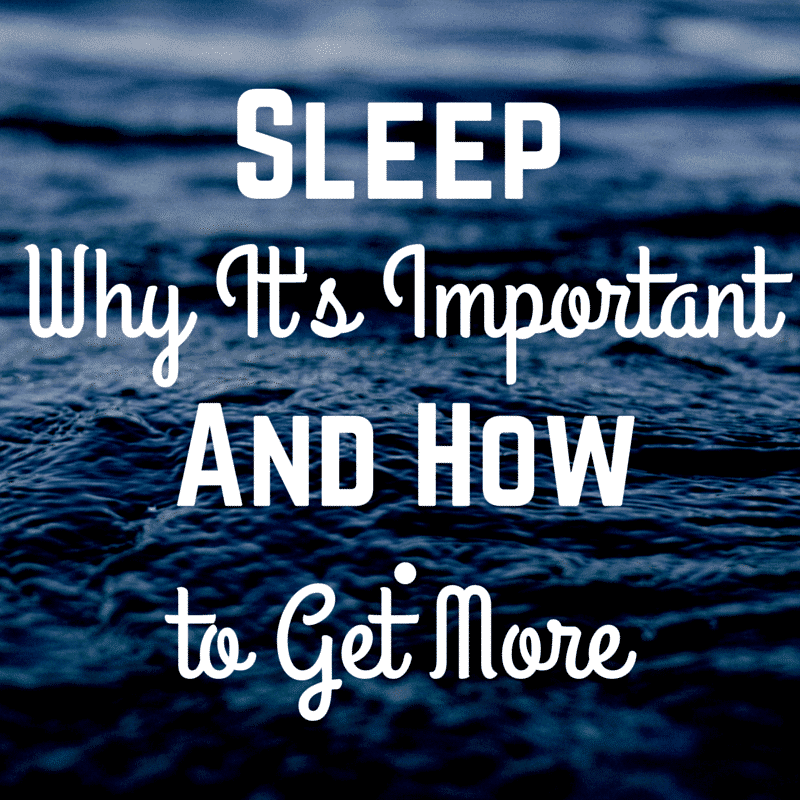Did you know May is Better Sleep Month? I think we all know that not getting enough sleep can make us irritable and unfocused, but as busy moms with lots of things to get done, sometimes we sacrifice sleep “for the greater good.” In honor of Better Sleep Month, I wanted to point out some of the reasons why you should limit those sacrifices. As it turns out, lack of sleep affects a lot more than your mood and productivity. Read on to find out how sleep impacts your health and, once you’re convinced that it’s important to get more sleep, keep reading for tips on how to do just that.
Sleep and Your Health
Most of us know that a good night’s sleep is healthy; but do we really take that advice seriously? Many times, we brush aside a full night’s sleep due to our busy schedules, a need for “down time” that keeps us up, or simply life’s circumstances. But a lack of sleep can result in more than just feeling tired (which is bad enough). Medical experts warn that chronic sleep deprivation can have serious effects on your health.

Here are some health problems that may result from lack of sleep.
Cancer
While not all cancer risks are affected by lack of sleep, studies have indicated that breast and colon cancer risk is greatest for those who work night shifts. Apparently, the exposure to light in the night-time hours reduces the body’s production of melatonin. Melatonin is a brain chemical that helps promote healthy sleep, but it may also reduce tumors and protect against cancer as well. The less you sleep, the less melatonin your body manufactures.
Heart Attacks
Statistically, heart attacks occur more often in the early morning hours. Experts believe this may have something to do with the particular way that sleep and waking affect the cardiovascular system. Studies have shown that the health problems that often lead to heart disease – obesity, high blood pressure, etc. – are exacerbated by lack of sleep.
Unhealthy Relationships
When you don’t get enough sleep, you tend to be moody and irritable, which is not good for any relationship. Also, sleep problems may lead to partners sleeping separately, or resentment on the part of one or both of the partners for the problem. This kind of tension may affect any children in the family as well.
Impaired Cognition
An inability to think straight or think constructively is a problem associated with sleep deprivation. You may have trouble remembering things, too, if you are not getting enough sleep.
Injury
From automobile accidents to accidents on the job, sleep deprivation has been implicated in all sorts of accidental injury situations. The brain just does not react as quickly or efficiently when you are starved of sleep, and clumsiness and mistakes are also symptoms associated with lack of sleep (and accidents).
Tips on Getting Enough Sleep
It’s easy to point to your schedule as the reason why you can’t get enough sleep. By the time you get a free moment it’s bedtime, and you really don’t want to go to bed just yet; you need some down time. Then you stay up too late and the cycle continues.
There are all sorts of other reasons, too, for not getting enough sleep. Maybe you have a spouse who snores, or you just have trouble sleeping once you do get to bed (insomnia). Whatever the reason, it’s important to make time and create the right environment for getting enough sleep. Here are some tips on how to do that.
It’s Bedtime
Remember how your parents pestered you about bedtime? They had a point. Instead of looking at the ever-later clock each night, knowing you “really should” get to bed, set a bedtime and stick with it. Most experts agree that you should go to sleep before midnight, preferably before 11pm.
If this isn’t possible, be realistic and set a bedtime when you know you can get it, even if it’s midnight or 12:30am. Then be sure you get between 7 and 8 hours of sleep.
Another note about bedtime – if it’s too early, that can cause problems too, experts note. If you find yourself fading to sleep at 7 or 8pm, you may find that you wake up in the small hours after only 5 or 6 hours’ sleep, and you can’t get back to sleep.
Your Bedroom
You may have a set-up in your bedroom that is not conducive to sleep. Here are some things to look for and adjust in your bedroom to make it more sleep-promoting.
- Dark and cool is the rule for a sleepy bedroom. Darkness is important for a proper night’s sleep – lights from neighbors’ homes, screens (including the TV or computer screen), lamps, and so forth can disturb your sleep patterns.
- Cooler temperatures are said to promote sleep. A higher body temperature may actually stimulate the body and prevent sleep, but cool temperatures help promote a comfortable night’s sleep.
- Your bed is for sleeping, not working. If you’re in the habit of working on bills, office work, etc. while sitting on or in bed, you might be inadvertently training your brain to be stimulated when you are in your bed. Also, it’s harder to walk away from work worries if you literally take them to bed with you! Try to keep your work in another room, or at least away from your bed.
- Keep it quiet in your bedroom. If you have trouble in this regard, use a fan or other source of white noise at night to drown out disruptive sounds.
Make Lists
Do worries keep you awake? Do you have a hard time turning off your brain? Making a list may help. Write down all of those things that are bothering you or that you can’t get your mind off of, and note some practical steps you can take in the morning (or during the upcoming day or week) to work those things out.
Limit Screen Time Before Bed
If you are in the habit of working on the computer or watching TV right up until bedtime, it might be inhibiting your ability to fall asleep. If you can manage it, it’s best to avoid screen time at least an hour before bedtime.
I hope I’ve convinced you that it’s important to get sufficient sleep and I hope these tips help you do it. Have some of your own tips to share? Please share them in the comments below.

I lo-ove to sleep, really enjoy it. I need to have my teens read this and point out the impaired cognition impact of lack of sleep. Maybe they’ll listen to Wondermom Wannabe, Corinne.
What a great list. I have always know that sleep was important, but didn’t know all of the reasons you listed. I have a habit of running lists in my head before bed! I like your tip about keeping a cool room. It is so much easier to sleep when the room is cool
I absolutely cannot sleep when I’m hot. I used to think my father was crazy for keeping his window open at night during the winter, but now I realize how much better I sleep when the room is cool and I bundle up.